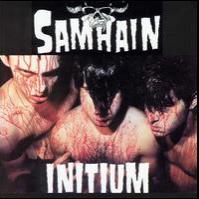A little music archeology, courtesy of March 1983’s Flesh and Bones fanzine, shows that even as the Misfits were active (but perhaps becoming annoyed with each other) Glenn Danzig was already plotting Samhain- at the time ostensibly as a side project. Well, as we all know now, Misfit tensions came to a head at their October 29, 1983 show and the band suddenly (or maybe not so suddenly) split.
With Samhain already in germination, Danzig switched it to his main creative unit and continued recordings sessions that began as early as August 1983. Indeed, rumors are that a few of the final Misfits tracks (“Bloodfeast,” “Death Comes Ripping”) were actually meant to be Samhain tunes. Likewise, “Archangel” from 1981, which was originally meant for Dave Vanian, was exhumed.
For his new band, Danzig recruited an all-star lineup (one that famously didn’t quite work out). Although Danzig recorded all the vocals and some of the guitars, he pulled in long time Misfits pal Eerie Von on bass, Mourning Noise’s Steve Zing on drums, and Minor Threat’s Lyle Preslar on guitar, who recorded about half of the new album’s guitar tracks.
Misfits and Minor Threat might look great on paper, but in real life, it did not work out, with Preslar being unceremoniously dismissed for not really being into the whole macabre thing. Regardless, just as Earth A.D. was a darker turn for the Misfits, Samhain’s Initium (impressively released by the very next year) found Danzig stripping away any vestiges of b-movie irony. One of the main Misfits angles was to take something that was silly at face value (“Teenagers from mars,” for example) and giving it a perverted presentation, in order to suggest something sinister lay beneath the rubber costumes.
By contrast, Samhain was more rooted in the occult and ancient rites (hell, the name is taken from pagan Gaelic beliefs) and instead of converting the silly into the sinister, they simply created dark music from dark material. Even the intro, which preceded the band’s self-named song, was a musing on fear and pain. Whereas the Misfits might make an oi-chorus for zombies to sing as they ate brains, Samhain literally worshipped at the altar of dark spirits. “The Howl,” while still on the lycanthrope angle of Wolfsblood, was as much about giving way to dark impulses as it was becoming a wolfman.
Perhaps most interesting is that, while many first wave punk bands were venturing further down the hardcore route (or... poorly done thrash route) Danzig both doubled down on the punk aesthetic- these tracks have the clomp and punch of the classic early punk singles- as well as pulled in some hints of goth structure. “Archangel,” which has a melody so melodic that it could easily be warped into a lullaby, had background howls and gossamer sounds that added a general creepiness and mysticism to the release. Not to mention, the track featured some of Danzig’s finest vocal work ever, with him using both his punk growl and ‘50s crooner approach.
If anything, Initium underscored just how talented and visionary Danzig is. When he could have stumbled by following trends, he stuck to his instincts and crafted a record that both utilized punk hallmarks, that was also willing to veer off in to the experimental. (The Misfits cover of “Horror Biz” also helped bridge the gap, mind you). Just as Bowie would shift his persona with every release so that each album linked to the last, until a decade later he was a different creature then before, Danzig followed in those wise steps by holding true to his core essence while venturing out into the unknown. Initium truly was aptly named. Glenn Danzig may have established himself with The Misfits, but it was this album where Danzig re-birthed himself as something much more than just the “horror punk” tag.
